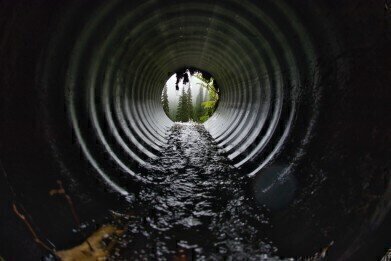Water/Wastewater
What Are Fatbergs?
Aug 07 2015
If you’ve ever wondered why we are all warned not to throw away excess fat and grease down our sinkholes or flush wet wipes and sanitary towels down the toilet, the answer is lurking in Britain’s sewer systems.
Fatbergs, ginormous conglomerations of congealed fat, grease, human excrement, wet wipes and other flushed-away items, can become lodged in sewers and drainage passages, blocking them up and causing the flooding of homes and businesses with sewage.
Icebergs of the Sewer
Blockages on household drainage pipes, which are generally of a diameter big enough to just squeeze a tennis ball through, are commonplace occurrences. However, backed-up sewage can even occur in sewage systems with a one-metre diameter, due to the presence of these unwanted icebergs of the sewer.
Earlier this year in April, a 10-tonne fatberg was removed from a sewer in Chelsea in west London. The goliath was a whopping 40m in length and was so big that it actually destroyed the one-meter wide sewer, costing Thames Water up to £400,000 in damages. In 2013, a 15-tonne specimen was discovered in Kingston, London, while last year an 80m fatberg was dislodged from underneath Shepherd’s Bush.
It’s no surprise that these fatbergs keep cropping up in the nation’s capital. With the highest density of restaurant and food production businesses anywhere in the UK, London kitchens produce an estimated 32-44 million litres of waste oil every year. The majority of this goes straight down the drain, where it congeals and combines with other unsightly waste to create these subterranean behemoths.
What Can Be Done
On an individual level, we can all help to avert the problem of fatbergs simply by throwing excess oil in the bin, rather than flushing it down the drain. Though it may seem like a small amount, if everyone pulls together, the problem can soon be significantly alleviated.
Furthermore, the increasing use of wet wipes in lieu of toilet paper has led to many people throwing these down the toilet as well. Since they are much harder to break down than traditional loo roll, they combine with the fat and create stodgy blockages in the system. If you are going to substitute wet wipes for toilet paper, simply throw these in the bin instead. The same goes for sanitary towels or any other items.
On an industrial level, companies have a range of options available to them when it comes to wastewater disposal. If it’s compliant with wastewater standards, they can simply flush it away and pay the regional water authority to handle it. Alternatively, they can treat it onsite to comply with Environmental Agency regulations and discharge it into a water way. Or, finally, they can pay for a private company to take care of it.
The article The Smart Alternative to Disposal Process Water talks about the huge savings that can be made when wastewater is processed in-house. Whatever option is taken, businesses and private homes both need to be aware that there’s no place for oil or fat in our sewage systems.
Events
Jul 23 2025 Sydney, Australia
Aug 24 2025 Stockholm, Sweden and online
Aug 27 2025 Busan, South Korea
Sep 02 2025 Mexico City, Mexico
Sep 02 2025 Mexico City, Mexico














